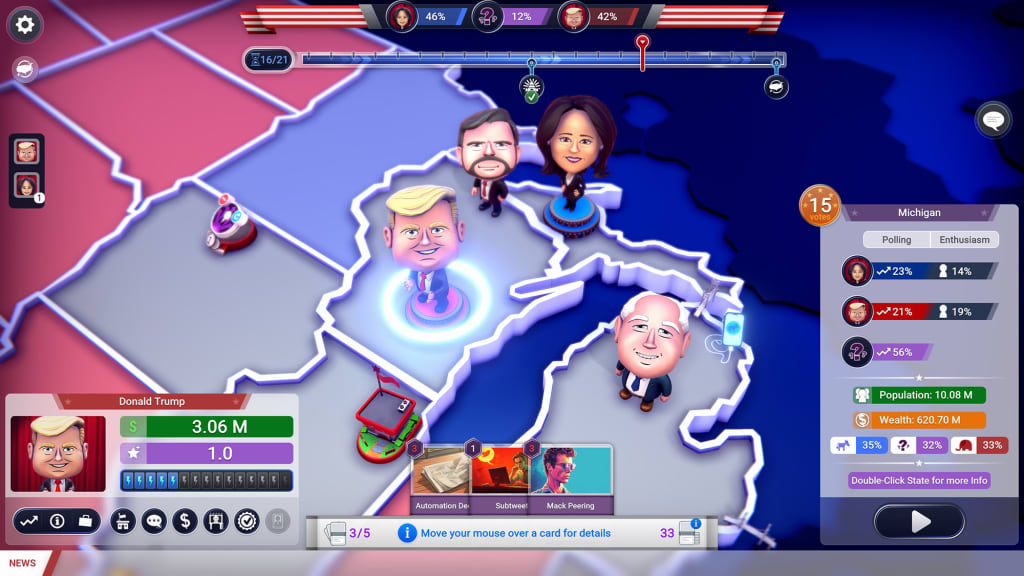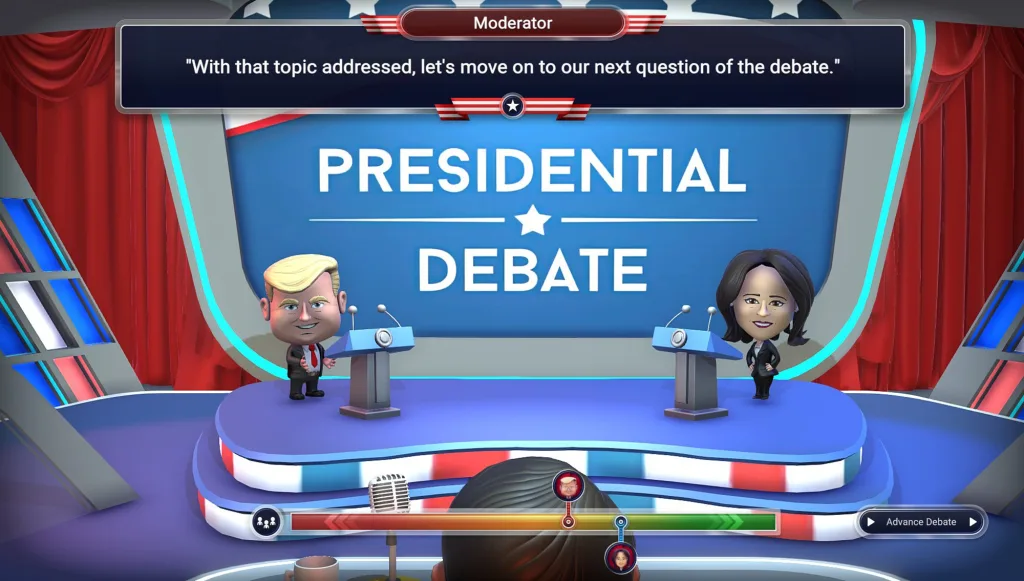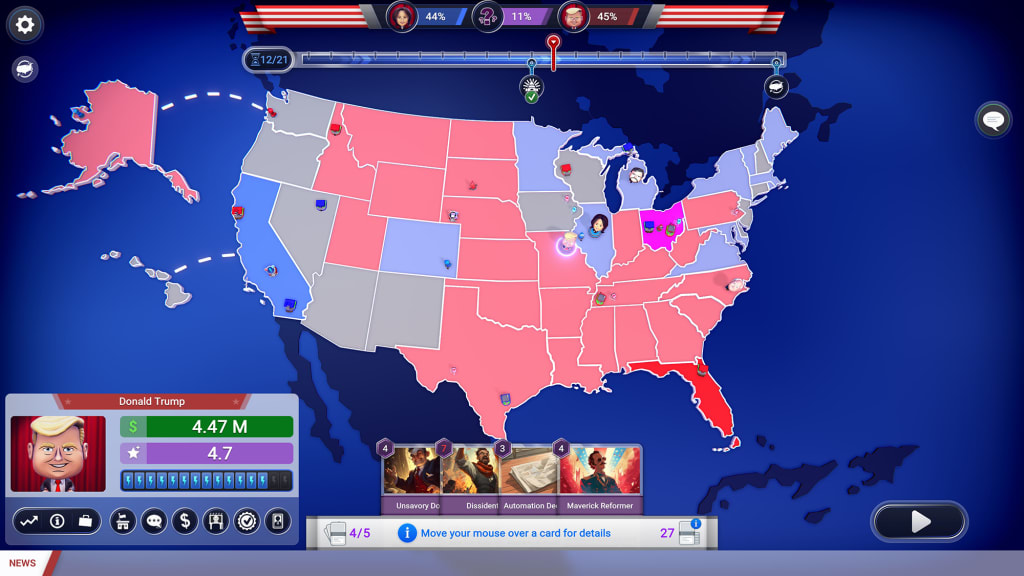If ever there was a time that Americans needed a video game simulation of the presidential election cycle, it was probably—well, never. But since 2004, The Political Machine has done just that, with a new edition every presidential election year for political junkies or game fans who love to plot strategy on a national scale. This year’s edition has sold more than 50,000 copies since the May launch of the 2024 edition, available for PC and Mac on Steam.
The results of the game have even had some pretty accurate results: AI simulations run by the game predicted key swing states in the 2004 and 2008 elections, and had Donald Trump winning the 2016 race, counter to polling predictions.
So to find out what it’s like to be a presidential candidate and why anyone would want to immerse themselves more in the election cycle, I gave the game a try. I also spoke with Brad Wardell, CEO and founder of Stardock Entertainment. Wardell says that increasingly sophisticated data tools have yielded some surprising results and might even help us predict elections more accurately.

A complicated simulation
My experience playing the game was at first maddening, then frustrating, then, as I got the hang of the interlocking elements of the game, almost fun. I do love strategy games but can’t describe myself as an avid gamer. As with any video game, becoming familiar with the game’s mechanics took some trial and error. I played several games as Kamala Harris and tried to stay as true as I could to what I saw as Harris’s major platform issues and behaviors.
This tracks with other players, Wardell says. Starting in 2016, Wardell says, most players refuse to play as anyone outside their own political party. The game designers added the primaries to the 2024 edition to make multiplayer more interesting, with up to four players able to face off ahead of the main race.
The Political Machine players can battle in multiplayer or against AI, using pre-selected characters from the roster of party leaders or with their own custom creations. The campaign runs from the primaries through Election Day when votes are tallied and a winner is declared. Elements like individual stamina levels (Joe Biden’s stamina level in the games is listed as “Sleepy,” while both Kamala Harris’s and Donald Trump’s are “Hyper”), political points, and fundraising ability affect each round of the game.
Since I was strapped for time, I skipped the primaries and dove straight into the election season with Harris as my candidate. Kamala Harris’s entry into the field, says Wardell, wreaked havoc on the game designers’ models and game metrics. The Stardock team had a new game patch out within a week of Harris’s selection, but the game is still learning what a Harris candidacy looks like.
“It’s interesting,” says Wardell, “the issues that do start to pop up that changed with voting patterns once we started running” Harris simulations. “Because the simulation is kind of complicated, we don’t always know why a particular issue ends up bubbling up.”

The ‘secret ingredient’ that pollsters don’t factor in
The game’s ability to model the effects of almost-real-time events, says Wardell, allow the election simulator to achieve surprisingly accurate models of voter behavior. In 2004, for example, Wardell predicted for CNBC that Ohio, not Florida, would be a significant factor in the election. Stardock runs near-constant games in its studios using new data, repeating the election process to try and perfect both the gamers’ experience and the game’s realism in predicting outcomes.
During my Harris campaign simulations, I made frequent trips to California and New York to raise funds, to the Rust Belt states for pro-union and pro-abortion rights rallies, and placed ads and command outposts in states I hoped to sway, like Georgia, Nevada, and Pennsylvania. Meanwhile, the AI Donald Trump zipped from Florida to Nevada to North Carolina, doing the same and rallying crowds with anti-immigration rhetoric and employing Political Action Cards like an Uno Reverse card, draining my character’s stamina and voter support.
Wardell cites the use of real-time data from news headlines and demographic census information for the occasional success of the game to predict voter behavior that pundits didn’t see coming. The Political Machine “doesn’t use polling to do its thing,” says Wardell. “We rely heavily on demographic issue patterns” like job, race, sex, and income level to determine “what issues they [voters] care about.”
These predictable actions led to some surprising results. The “secret ingredient” that many pollsters don’t factor in but the game does, says Wardell, “is that we use enthusiasm as the metric for determining whether those people will actually come out and vote.”
Issues like early voting and mail-in voting, as well as natural disasters and pandemics, wreak havoc on the prediction ability of pollsters and game players alike. He says that the Stardock team is already at work on 2028’s edition, promising a more nuanced approach to the debate simulation that takes into account candidates that he says, “ let’s just say unique in their debate style.”

‘The game is leaning Trump,’ but there is still ‘anomalous data’
Because I am neither a political expert nor a strategy game master, I can’t draw any conclusions from my own multiple game losses as Harris. But Wardell has some ideas.
His prediction, based on the game’s AI simulations? “The game is leaning Trump,” he says, winning the electoral college and losing the popular vote. “The state that is going to be weird this time is North Carolina.” Even before Hurricane Helene hit the state, The Political Machine started seeing some “anomalous data” in mid-September, says Wardell.
Then again, just as in the real world, The Political Machine’s gaming data and simulations change by the minute. Any big rally or national disaster, a November surprise, or major advertising push might just be the secret ingredient to getting those voters fired up and at the polls. Unfortunately for all of us, it’s not likely that the final results will pop up on our screens quite as quickly on election night as they do in the game.
Accedi per aggiungere un commento
Altri post in questo gruppo


Welcome to the world of social media mind control. By amplifying free speech with fake speech, you can numb the brain into believing just about anything. Surrender your blissful ignorance and swall

Few periods in modern history have been as unsettled and uncertain as the one that we are living through now. The established geopolitical order is facing its greatest challenges in dec

Substack and Patreon are vying to become creators’ primary revenue stream.
For most influencers, payouts from platforms like Meta or Google aren’t enough to build a sustainable career. R

The European Commission is coming for “SkinnyTok.”
EU regulators are investigating a recent wave of social media videos that promote extreme thinness and “tough-love” weight loss advice,

The infamous “Am I The A**hole?” subreddit is making its way to the small screen.
Hosted by Jimmy Carr, the new game show for Comedy Central U.K. will feature members of the public appea

Former employees of OpenAI are asking the top law enforcement officers in California and Delaware to s
